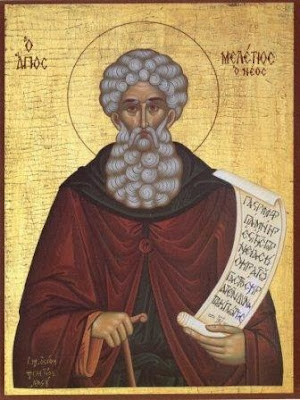 |
| St. Meletios the Galesiotes (Feast Day - January 19) |
Verses
David slew with a sling, he who was of another race,
Meletios also slew, those Ausonos who are in error.*
Born with the name Michael in 1206 in Theodotos of Pontus to parents whose names were George, a military man, and Maria, he was called by God at a young age due to his love for sacred things. Michael therefore abandoned his homeland and his beloved family and set out as a pilgrim for the Holy Land. Becoming a monk on Mount Sinai and taking the name Meletios, he spent weeks without food and nights without sleep, continuing in fasting, vigils, and ceaseless prayer to the astonishment of all his fellow monks. Having wandered through the deserts of Egypt, Palestine and Syria, like a diligent bee gathering the nectar of the virtues from the holy ascetics he met, Meletios settled near Ephesus on Mount Galesion at the Monastery of Saint Lazarus, becoming perfect in obedience and the ascetical life.
Christ the Lord appeared to him in glory, commanding him to go to Constantinople around 1261 to defend the Orthodox faith, which was in danger from compromises with the Latins that Emperor Michael VIII had made for political reasons. There he lived at the Monastery of Saint Auxentios on Mount Skopa (or Mount Saint Auxentios) with his companion Galaktios from Mount Gelasion. Presenting himself at the imperial court in 1273 after the anti-unionist Patriarch Joseph I swore an oath not to accept the union which led to his resignation, Meletios and Galaktios boldly reproached the emperor as a second Julian the Apostate for betraying Orthodoxy. Thrown into prison, he was then exiled to the island of Skyros where he authored a long poem called the Alphabetalphabetos, in which he desired to set forth all the essentials of the Orthodox faith in a single gathering. Sent to the Pope in Rome for trial, Meletios continued to boldly confess Orthodoxy, confronting the Latin scholastic theologians and rebuking their errors. Imprisoned for seven more years, he was then sent back to Skyros and later Constantinople and shut up in a dark dungeon.
The peoples’ proclamation of the Saint as a Confessor of Orthodoxy stirred the Emperor to summon him back to the imperial court. Steadfast as ever in proclaiming Orthodoxy, the Saint was condemned to torture. He was hung on a dry tree which burst into leaves upon receiving him. His tongue which had so bravely spoken the truth was cut out, but miraculously he was able to continue proclaiming the true faith. Galaktion his companion was blinded. Finally released from imprisonment on the death of Michael VIII, Saint Meletios played an important role in re-establishing Orthodoxy.
Between 1271 and 1274 Meletios established a monastery near Cape Akritas dedicated to the Apostle Andrew. Patriarch Joseph (1267–1275, 1282–1283) desired to ordain him a priest, but he refused. He authored much concerning Orthodoxy and the errors of the Latins. His most important work is titled the Alphabetalphabetos, written while in exile in 13,000 un-rhymed and political verses to expound theological and educational matters.
When he departed from this world to God in 1283 at the age of 77, his face shone like the sun. His body was buried at the Monastery of Saint Lazarus and remained incorrupt, becoming a wellspring of countless miracles.
Notes:
* The Ausonos were among the early inhabitants of Italy.